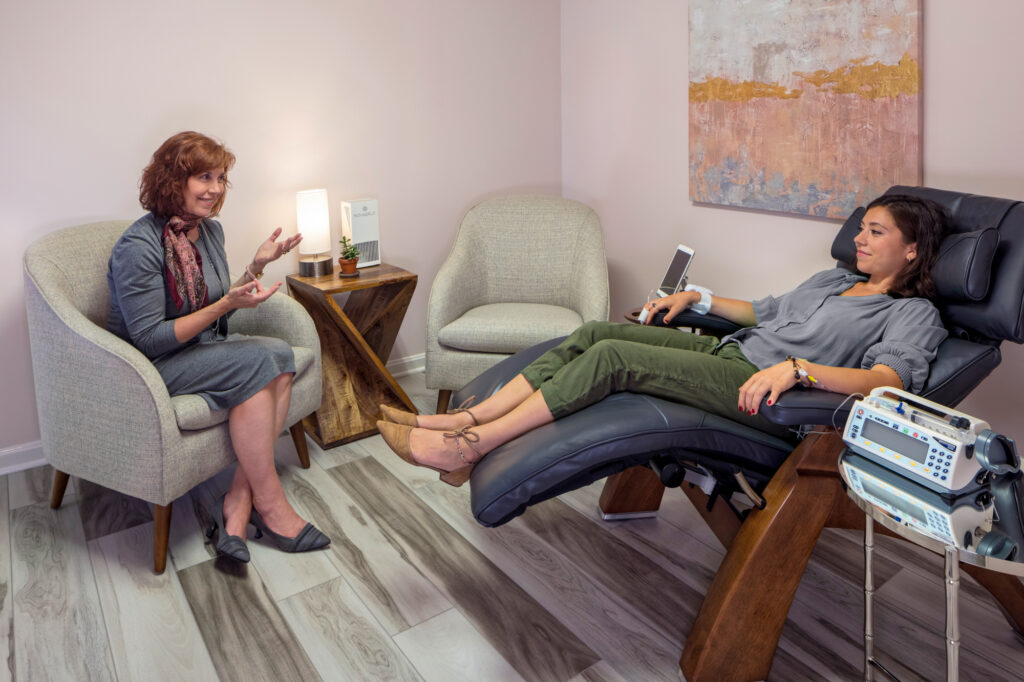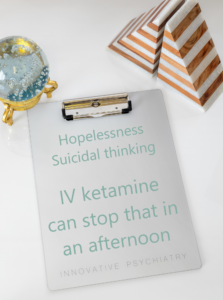
Will IV Ketamine Help My Depression?
This is the one of the most common ketamine treatment FAQs!
Based on research at major medical centers over the past 15 years, and our own extensive experience, up to 80% of all patients, including patients with treatment-resistant depression, can expect significant and fast relief. Of course, we can’t predict your individual results but we will evaluate all of the positive predictive factors that make it likely that you will respond to IV ketamine–and anything going on that might get in your way.
Why IV? Read this.
Our treatment is tailored in terms of frequency and dosage for each person, and we believe it offers you your best chance of success.
Please read through the rest of our Ketamine FAQs, and of course, call us if you have questions we haven’t answered here.
How Many Ketamine Infusions Do I Need?
That depends on your response to the first treatment or two. Most patients receive a series of six infusions, and within that series of 6 there is a bimodal response pattern — that means that some patients respond dramatically after just one or 2 infusions, and others really turn around between their 4th and 6th treatment.
Some patients are almost, but not quite, in remission by their 6th treatment. And they might schedule an additional treatment or two to get there.
We’ll work with you to customize your treatment for the best possible outcome.
Are There Any Long Term Side Effects from IV Ketamine Treatment?
Standard antidepressants and mood stabilizers often produce side effects such as weight gain, sexual dysfunction, sleep disturbances and fatigue.
However, low dose IV ketamine treatment results in no known long-term side effects.
What Medical Conditions Could Keep Me from Receiving Ketamine?
There are very few. We will discuss any possible contraindications that you may have when we meet with you.
Do I Need to be Referred by a Psychiatrist?
No.
You or your family may call for an appointment, and your psychiatrist, therapist, PCP or APRN may call to refer you.
 We’ll work with you to obtain as much information as possible before your first visit. If you are seeing a psychiatrist, APRN, or therapist, please ask them to call us before we see you and send us a copy of their most recent office note.
We’ll work with you to obtain as much information as possible before your first visit. If you are seeing a psychiatrist, APRN, or therapist, please ask them to call us before we see you and send us a copy of their most recent office note.
It’s important that we coordinate your treatment with your healthcare team — your current psychiatrist, therapist and PCP or OB-GYN, and any other specialists you choose to coordinate your care for an optimal response.
We offer IV ketamine infusions as an adjunct to your current treatment and we work as a consultation and specialty service for you and your doctors or APRNs, returning you to their care once your complete your treatment with us.
Will I Require Ketamine Infusions for the Rest of My Life?
Probably not. Some patients achieve long-term relief after a series of infusions.
I Have Bipolar Disorder. Will Ketamine Make Me Hypomanic?
It can. Hypomania has been reported following ketamine treatment. We have extensive experience using ketamine in patients with bipolar I and bipolar II disorder including bipolar disorder in teens and have written dozens of blog posts on this topic. If you have bipolar disorder, we’ll talk about how to use ketamine treatment to get you out of depression without risking a switch into hypomania or mania.
Where is the Treatment Performed?
Your IV ketamine treatment is administered in our beautiful, relaxing office using state of the art  technology and monitoring.
technology and monitoring.
If Ketamine Treatment Works for Me, How Soon Will I Begin to Feel Better?
Some patients begin to feel better within hours of their first infusion. Patients with thoughts of self-harm often notice those thoughts dissipating first. There can be a dramatic relief of dread and hopelessness. Other patients may not notice any mood improvement until the next day. Some patients will require 3 or 4 infusions before they begin feeling better. And some patients may need more than 8 or 9 infusions instead of 6.
We monitor your progress carefully and adjust your dose and infusion schedule for your maximum benefit.
Will My Current Psychiatric Medications Interfere with IV Ketamine Treatment?
Anti-depressant medications (SSRIs, SNRIs, TCAs, MAOIs and atypicals) and most mood stabilizers do not interfere with ketamine, and there is no need to stop them before you begin ketamine treatment.
If you take a high dose of a benzodiazepine every day (particularly clonazepam, but also alprazolam or lorazepam) you may have a reduced response to ketamine — but taking these medications doesn’t mean that ketamine cannot help you. It can. But it may take longer, or take more.
Lamotrigine (Lamictal) in doses over 100 mg/day will likely blunt your response to ketamine. You should not decrease or stop taking any prescribed medication without first consulting your psychiatrist or prescribing physician, and we will work with him or her so that you’re optimally ready to respond to treatment when you begin.
Will My Insurance Company Pay for Ketamine Infusions?
If you have out of network coverage with your current insurance plan, you are very likely to get reimbursed for a large part of your treatment costs with us. (Hooray!)
 We can provide a billing statement with all the necessary codes so that you may submit it for reimbursement. We have also published peer-reviewed research which shows that the ketamine treatment we provide can decrease ER visits and hospitalizations — a huge cost-savings for insurance companies that should get them to sit up and pay attention! We can send you a copy of our peer-reviewed, published research paper to submit with your reimbursement claims once you start treatment. It’s a very powerful tool to have in your back pocket because the data was generated in our practice and is specific for the IV ketamine infusions we provide. Other anesthesiologist and nurse practitioner practices can’t lay claim to it.
We can provide a billing statement with all the necessary codes so that you may submit it for reimbursement. We have also published peer-reviewed research which shows that the ketamine treatment we provide can decrease ER visits and hospitalizations — a huge cost-savings for insurance companies that should get them to sit up and pay attention! We can send you a copy of our peer-reviewed, published research paper to submit with your reimbursement claims once you start treatment. It’s a very powerful tool to have in your back pocket because the data was generated in our practice and is specific for the IV ketamine infusions we provide. Other anesthesiologist and nurse practitioner practices can’t lay claim to it.
If you do not have out of network coverage, your insurance company will not reimburse you for the cost of your treatment treatment, because we are not contracted with insurance companies.
If you have Medicare, we are not a Medicare provider, so Medicare will not cover your ketamine treatment, and your secondary insurance company will not reimburse you.
If ketamine treatment is out of reach for you, we offer financing through one of our financing partners.
Are Ketamine Infusions Addictive?
No.
Treatment Day Questions
Can I Eat or Drink Before My Appointment?
You cannot eat for 4 hours before your appointment, but you may drink liquids freely to stay hydrated–so important before an IV! (It is a bit of balancing act, because sometimes even water in your stomach can increase the risk of nausea.)
Do I Need to Bring Someone With Me?
Given the pandemic, and our very strict protocols for your safety and for social distancing, we cannot accommodate a family member or a friend in your treatment room with you.
We require that you have someone drive you home after your treatment. We advise you not to drive a car or make important decisions until the following morning.
What Should I Expect During the Infusion?
Ketamine is administered over a period of about 45 minutes. Your dose is individually determined by your weight. The amount of ketamine administered is not enough to cause a loss of consciousness, so you’ll remain awake but feel very, very relaxed.
During the infusion, some patients experience odd perceptions—like seeing bright colors or textures. Some report what is referred to as a “dissociative,” or “out of body” experience. These are “side effects” of ketamine that we consider important — they’re important for ketamine’s ultimate effectiveness. Most of our patients tolerate their ketamine infusions beautifully, and many people find them pleasant. (Some say that they’ve never felt more relaxed in their lives!) Even for the same person, each infusion is a different experience.
Once the infusion ends, ketamine washes out of your system quickly with no delayed “flashbacks” of treatment experiences. But the biological changes that ketamine kick-started keep going. Read a short bullet-list about them here.
Our patients generally leave our office within 15-20 minutes following their infusion and feel quite normal.
Are There Other Side Effects that I Could Experience During or After My Ketamine Infusion?
Most patients are slightly light-headed for about 10 minutes after the infusions ends, and then this lifts.
Occasionally patients experience some nausea during or following an infusion. If so, we have medication that will help. More rarely, a patient may experience a transient headache or fatigue.
Very, very rarely patients already at risk for seizure have reportedly experienced one, although this has never occurred in our practice. If you have a seizure disorder, please be sure to share that information with us prior to your treatment.
What Happens After My Series of Ketamine Infusions?
 Following your initial series of infusions, you may consider returning for single infusions intermittently as you need them, or you may return on more of a schedule for maintenance infusions if you need those. We’re a very different kind of practice — we offer what’s best for your wellness plan. Refreshing. Flexible. Unusual. (It’s about you, it’s not about us.)
Following your initial series of infusions, you may consider returning for single infusions intermittently as you need them, or you may return on more of a schedule for maintenance infusions if you need those. We’re a very different kind of practice — we offer what’s best for your wellness plan. Refreshing. Flexible. Unusual. (It’s about you, it’s not about us.)
The interval between follow-up infusions varies from person to person.
Contact us or call to learn more about IV ketamine treatment and to make an appointment. You’ll be amazed at the improvement you can experience after one, two, or three ketamine treatments.